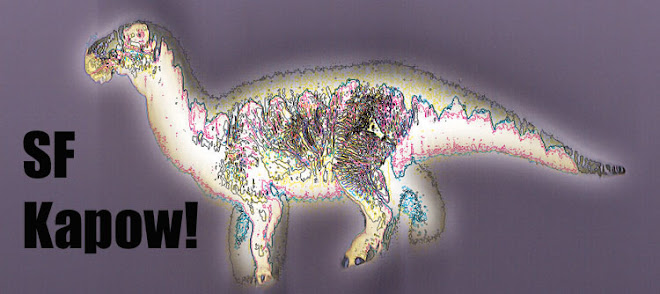He's right. I'm not going out of my way to read The Turner Diaries, by William Luther Pierce, anytime soon. Ever since it was raised to true notoriety along with Timothy McVeigh and his madness, I've seen it mentioned off-handedly as a novel about a future race war.
It's far worse than that, as Lee tells us. It's the diary of a member of a far-right white supremacist organization which launches the ethnic cleansing of the United States, and then the world. Along the way, they slaughter every white woman who's ever slept with a man of another colour, and start a nuclear war. It sounds like something written from a perspective of self-devouring hate, the kind that leaves something hollow and vile, at the far end of human. Lee does nothing to dissuade readers from this view
I recommend Turner because it's poisonous. I don't envy anyone who reads it without building up tolerance to the darker ends of genre fiction and to work written by people who hate you personally and want you dead. This book should hurt going down — if it doesn't, you shouldn't read it. It's worth the pain, though, and more to the point, provides an opportunity that should hit us all hard in the center of our eternal eleven-year-olds: saving the world from evil, no shit.
This book is the Necronomicon. The Turner Diaries is bound in human skin, written in blood and contains demons — real ones, not Biblical bogeys. We've all witnessed the power of these monsters. This is the real deal from all those horror stories: the book of secret dark knowledge, access restricted to its devoted worshippers yet hidden in plain sight, awaiting the one who can best harness or defeat its pure evil.
What struck me was that the framing structure of the story seemed familiar.
It's the diary of a member of a "persecuted minority" in the near future, with the document itself supposedly having been discovered and published in the farther future.
That's identical to the framing structure of The Handmaid's Tale.
Notably, they're both dystopian novels (although readers of The Turner Diaries might not consider it dystopian to slaughter 95 per cent of the world's population), they both concern a resistance to the established order, and they both end with the main character taken off the stage. Turner himself dies a suicide nuclear bomber (of course) destroying Washington D.C. (of course) whereas Offred simply takes a chance at escape and vanishes from her own narrative. Given the world she's escaping through, her end is not likely a happy one. Lastly, many people wouldn't consider either book to be proper SF, whatever that is. Atwood has been famously defending herself against the charge of writing SF ever since Handmaid's Tale was published.
I don't mean to say here that there are any similarities in philosophy, ideology, or quality between the two books. Indeed, you'd have to wander far and wide to find two books generated from such opposite ends of those spectra. Atwood's work is genuinely art, and my only complaint about the text is that sometimes it feels like Atwood-the-poet overrides Atwood-the-novelist. The book is, in fact, sometimes too well written, and the finely crafted metaphors can kick you right out of the grim reality of Gilead.
My hypothesis is that the structural similarities are a matter of parallel literary evolution. Both Pierce and Atwood needed to tell a particular kind of tale, and they found the discovered diary, which is one of the oldest frame stories for fantastic tales, to be the best format. Because it goes back as far as Gulliver's Travels, it has a certain respectability lacking to the full immersion approach that SF has championed for its readers. The frame story offers a way for non-SF readers - the target market for both books - to be eased into a strange world. All political fiction is propaganda, and none more so than dystopian and utopian novels. Artful or wretchedly written, vile or virtuous, the propagandist has to connect with their audience.
I just hope more copies of The Handmaid's Tale are selling this year than The Turner Diaries.

1 comment:
The Turner Diaries also reads a lot like Heinlein's "Revolt in 2100" and Norman Spinrad's The Iron Dream, which is a standard pulp SF/post-apoc/war novel filtered through Adolf Hitler's various psychoses.
A given genre form can be used for a variety of different purposes and political agendas. The Gothic form has been used by Diderot and other Englightenment writers to expose state injustice, and by Harriet Beecher Stowe to expose the injustice of American slavery, but it is also a staple of pornography.
Post a Comment